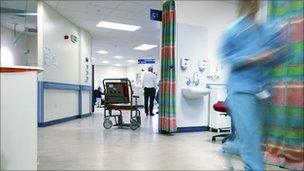'Shock' over Welsh NHS underfunded compared to England
- Published

The gap is a legacy of the underfunding of Wales as a whole, says the assembly government
The NHS in Wales has been underfunded compared with the health service in England for the last six years, the Welsh Assembly Government has admitted.
A five-year strategic plan for the health service's future says growth in cash funding has been one-third lower than that for NHS England.
The assembly government said the gap was a legacy of underfunding of Wales as a whole.
The Lib Dems called it "shocking". The Tories blamed ministerial management.
The strategic plan warns that NHS organisations in Wales "enter this more challenging economic period from a less financially secure platform" than England.
However, the assembly government said that health spending was a "priority".
Health Minister Edwina Hart has already warned that without radical reform and cost savings, the health service faces a potential deficit of nearly £2bn a year in five years' time.
The five-year strategic plan said: "NHS Wales faces significant and increasing financial challenges.
"The state of public finances means that funding growth will be much smaller over the coming years than it has been in the recent past, while cost pressures are likely to continue to increase.
"In addition, the total growth in [cash] funding provided to NHS Wales over the last six years has been a third lower than that provided to NHS organisations in England, while operating cost pressures and the targets set for improving service quality and service access have been very similar in the two countries."
The admission has been seized on by the Welsh Liberal Democrats, who said the report should be a source of concern for patients.
'Very fragile'
Veronica German AM, Welsh Liberal Democrat health spokesperson, said the NHS in Wales was in a "very fragile position".
She said: "The shocking report reveals for the first time that the momentum of improvements to the funding of our health service has stalled significantly compared to England.
"If this has been the case for the past six years, there will be deep concern about the very financial future of the NHS as public spending tightens."
Ms German said it was "scandalous that the health minister has repeatedly refused to ensure that money is being spent effectively within the NHS".
She added: "She has spent millions of pounds on costly reorganisations, refused to look at claims that a fifth of her budget is spent ineffectively and refused to cut the number of senior management posts.
"At the same time we have lagged behind England in waiting list performance, ambulance response times, stroke services and cancer survival rates."
The Welsh Conservatives said the assembly government had inadequately managed the NHS in Wales and they want claims of misspending of funds fully investigated.
Shadow Health Minister Andrew RT Davies AM said: "This report shatters the cosmetic front of the assembly government and their claims that the NHS is a true priority."
'Compelling evidence'
The plan reveals the scale of cutbacks the Welsh NHS will have to undertake if it is to break even over the coming years.
Unlike in England, the assembly government has ruled out ring-fencing spending on health, as this would have a disproportionate effect on other devolved budgets.
An assembly government spokesperson said: "The Holtham Commission presented compelling evidence that Wales was underfunded by some £300m per year and the total level of resources will clearly have an impact on our investment decisions.
"The NHS has, and always will be, a priority for the assembly government - demonstrated by 40% of our budget being invested in health and social services.
"This has increased significantly since 1999 and now stands at £6.3bn.
"With that significant investment, we now have more staff, new buildings and equipment, and waiting times have fallen and patient care has improved."
However, Tina Donnelly from the Royal College of Nursing (RCN) said she still remained surprised to discover the level of the NHS funding deficit.
"Looking at the early 1990s where we had a huge deficit in the numbers of professional workers working in the NHS and long waiting lists, we have seen in fairness, an increase in nursing numbers and in medical staff numbers," she remarked.
"But in the last year or so we know that there is increasing pressure on the NHS to curtail cost."
She said it was now time for the all parties to come together to address the issue.
"I'd be asking if the Lib Dems and the Conservatives in central government now, isn't it the opportunistic time for the whole of the polictical parties in Wales to push for an increase in the Barnett formula and recover that £300m underfunding for Wales," she added.
- Published7 July 2010
- Published2 July 2010